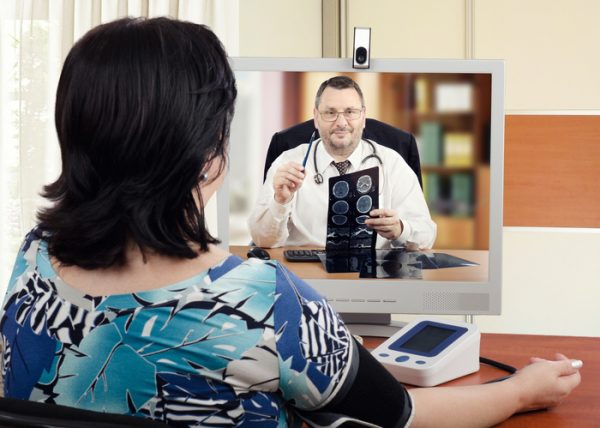
The U.S. healthcare system has been in need of change for a long time. Our costs are among the highest in the world (almost 20 percent of GDP), providers are burnt out and patient satisfaction has plenty of room for improvement. However, in the era of Covid-19, it’s almost as though healthcare has been knocked back 80 years when house calls made up 40 percent of US doctors’ visits.
After three decades of working on both the provider and technology side of healthcare, I’m more encouraged about the future of healthcare now than I ever have been. In the face of tragedy, health systems in the U.S. are innovating at an incredible pace to attempt to flatten the curve and continue to provide non-Covid-related care to those who need it. Perhaps this is the silver lining of the Covid-19 pandemic: we’re being forced to accelerate changes that the healthcare industry has been slow to adopt to lower costs, improve outcomes, and increase patient and provider satisfaction.

Health Benefit Consultants, Share Your Expert Insights in Our Survey
Susan Collins Susan Lucas Collins is the Global Head of Healthcare Services at Twilio. She has extensive experience managing through shifting regulatory and reimbursement models, has provided trusted counsel to executives seeking insight in rapidly evolving markets, and is passionate about developing solutions that create a measurable difference in the world. Prior to Twilio, she […]
In the last few months, we’ve challenged the notion around healthcare having to be provided within the bounds of a hospital or doctor’s office. Through laptops, tablets, and cell phones, providers are once again coming to their patients, and technology is returning a level of patient and provider intimacy that we’d slowly lost in the previous decades.
Ready or not, unprecedented change has arrived. Responding to the Covid-19 crisis has required major changes from the healthcare industry – like the rapid shift to telemedicine, the ability for administrators to work remotely and the myriad uses of data to track the disease. But beyond the immediate pivots in how patients are receiving care during this critical time, many changes are likely to become permanent when the crisis subsides. And ultimately, the way we deliver healthcare will be changed for the better.
Overnight, healthcare organizations have introduced technology to create tools that better serve patients and are more seamless for clinicians. Web-based and SMS chatbots are answering patients’ coronavirus-related questions. Interactive voice response (IVR) systems are handling increased phone call volumes and helping to share accurate information about public health measures. Notification systems are helping to keep people informed en masse. Remote contact centers are popping up to handle emergency response. And we’re seeing that telehealth visits can often accomplish through video what could once only happen in person, while patients remain in the safety of their own homes. These solutions will have staying power long beyond the pandemic.
The necessity driving the implementation of new solutions has pushed aside the excuse not to innovate, and there’s no going back. We know now that it’s not only possible to rapidly deploy a better patient and provider experience through technology, while ensuring privacy and security, but it’s practical. Apps are providing text communication for patients living with chronic conditions. Health coaches are using video and text to give personalized nutrition and fitness advice to clients sheltering in place. We are living in a momentous time in history which will inform the future of healthcare from this point forward.

A Deep-dive Into Specialty Pharma
A specialty drug is a class of prescription medications used to treat complex, chronic or rare medical conditions. Although this classification was originally intended to define the treatment of rare, also termed “orphan” diseases, affecting fewer than 200,000 people in the US, more recently, specialty drugs have emerged as the cornerstone of treatment for chronic and complex diseases such as cancer, autoimmune conditions, diabetes, hepatitis C, and HIV/AIDS.
The unprecedented speed at which healthcare providers have been able to build and scale in response to Covid-19 is thanks to software – the unsung hero of this pandemic. Software provides the ability to scale with the cloud, build fast, and connect with patients one-on-one; and from there, solutions and inventions are being born from our current necessity. Even after the coronavirus is contained, we’ll see these new trends persist: video visits for routine and even some acute care needs, at-home health screening and monitoring, and the wider use of artificial intelligence to support patients remotely.
Housecalls may not arrive in the form of a horse and buggy, but after experiencing the convenience and value of receiving care on the channel that they prefer and exactly when they need it, consumers will expect this level of care from here on out.
Photo: verbaska_studio, Getty Images
Susan Lucas Collins is the Global Head of Healthcare Services at Twilio. She has extensive experience managing through shifting regulatory and reimbursement models, has provided trusted counsel to executives seeking insight in rapidly evolving markets, and is passionate about developing solutions that create a measurable difference in the world. Prior to Twilio, she led Salesforce’s healthcare and life sciences organization.












